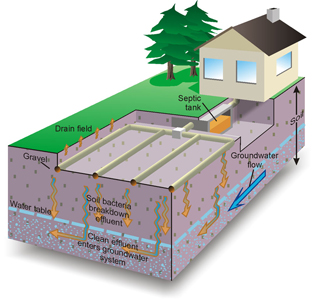Although their work is not glamorous, bacteria in septic tanks are the work horses of your system. Keep the bacteria in your septic tank happy and healthy.
While inspections and pumping go a long way, many are surprised to find that your septic tank is a living organism—at least the bacteria living there are. With trillions of bacteria naturally present and working to decompose the solid waste in your tank, it is important to know how to take care of them without upsetting the system.
What Are The Bacteria Living In Your Tank?
Bacteria are separated into two categories: Aerobic and Anaerobic. Aerobic Bacteria are more efficient than their counterpart when it comes to breaking down and using waste as fuel. However, they need plenty of oxygen to survive and are highly sensitive to environmental changes. With little to no need for oxygen and more resilience to environmental changes, the climate of a septic tank suits Anaerobic Bacteria better.
How Do Bacteria Help Your Septic System?
With solid waste often settling on the bottom of your septic tanks, it is hard for the flow, pumps and filters to reach it once it is on the bottom. Enter bacteria! They work to break down solids by digesting the waste as their fuel and excreting is as liquids and gasses. In fact, they are so efficient that they can handle decomposing up to 50% of the waste in your septic tank.
Is Other Maintenance Required?
While 50% is a substantial amount and goes a long way to keeping your septic system in working order, the bacteria need a helping hand. As the undigested solids begin to build up, it can become suffocating and hard for the bacteria stay ahead. To keep the colonies of bacteria healthy it is suggested to have your tank inspected every 5 to 7 years and pumped when the solid waste level is over 25% of your tank. When you get your tank inspected, your septic professional can recommend whether a pumping is needed. Keep in mind, a system does NOT need to be pumped in order to be inspected.
What Can Disrupt Septic Tank Bacteria?
Although not on purpose, there are a few common household chemicals and practices that can hurt bacteria colonies over time. This list includes:
Household Chemicals
Liquid bleach, disinfectant cleaners, drain cleaners, non-degradable detergents, solvents (such as paint thinners), insecticides and some prescription drugs such as antibiotics or strong medications. While anaerobic bacteria are resilient and able to handle the occasional chemical, large quantities can kill the colonies over time.
Antibacterial Cleaning Products
Marketed to kill bacteria, hand soaps and other antibacterial cleaners are designed to not only keep your hands, counter tops and household clean, they can also kill off the bacteria in your septic system. We aren’t suggesting stopping washing your hands, but keep this in mind when thinking about the longevity of your septic tank.
Flushable Wipes
Flushable wipes don’t decompose, leaving layers and layers of unbroken down solids that bacteria have a hard time decomposing.
Septic Additives
Like many things, the natural process doesn’t need your help. Even the EPA agrees, stating that septic additives “may actually hinder effective septic system operation by destroying useful bacteria that aid in the degradation of waste, resulting in disrupted treatment activity and the discharge of contaminants.” So we say, don’t waste your money! If you do want to lend your system a helping hand check out this blog post that separates fact from myth on how to bolster the health of your bacterial colonies.
The stakes are high to keep your septic system in top condition, and that means keeping the trillions of bacteria happy and healthy! Have questions? Give us a call today!



